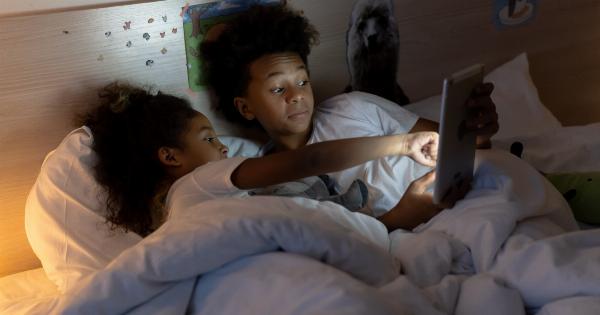In today’s digital age, tablets have become an integral part of our daily lives. From browsing the internet to watching videos and reading e-books, tablets offer convenience and entertainment.
However, the increasing use of tablets, particularly at night, is causing a detrimental impact on our sleep patterns and overall health. In this article, we will explore the effects of nighttime tablet use on sleep and why it is crucial to establish a healthy digital routine for better quality sleep.
The Role of Blue Light in Sleep Disruption
Tablets, like other digital devices, emit blue light that mimics the natural light of the sun.
While this is beneficial during the day as it helps keep us alert and awake, exposure to blue light at nighttime hinders the production of melatonin, a hormone responsible for regulating our sleep-wake cycle. When our melatonin levels are disrupted, it becomes challenging to fall asleep and maintain a deep sleep throughout the night.
Impact on Sleep Quality
Nightly tablet use has been directly linked to poor sleep quality. Research suggests that individuals who use tablets before bed experience difficulty falling asleep, frequent awakenings during the night, and overall reduced sleep duration.
This lack of quality sleep can lead to daytime sleepiness, decreased concentration, and impaired cognitive function. Moreover, inadequate sleep has been associated with various health issues, including increased risk of obesity, diabetes, cardiovascular diseases, and mental health disorders.
Disturbed Circadian Rhythm
Our body’s internal clock, also known as the circadian rhythm, relies on external cues such as light and darkness to regulate sleep patterns. The blue light emitted by tablets disrupts this natural cycle, sending mixed signals to our brain.
This disturbance confuses the body’s ability to differentiate between day and night, further contributing to irregular sleep patterns and insomnia.
Nighttime Tablet Use and Children
Children and adolescents are particularly vulnerable to the negative effects of nighttime tablet use on sleep.
With the widespread availability of tablets and educational applications, many kids use tablets for recreational and learning purposes before bedtime. A study conducted by the National Sleep Foundation found that children who used tablets at night had significantly shorter sleep duration and less overall sleep quality compared to those who did not use tablets.
Sleep deprivation can cause behavioral problems, learning difficulties, and poor academic performance in children.
Strategies for Reducing the Impact
While completely avoiding tablets at night may not be feasible for everyone, there are several strategies one can adopt to mitigate the impact of nighttime tablet use on sleep:.
1. Limit Tablet Use Before Bed
It is advisable to stop using tablets at least 1-2 hours before bedtime. This allows your body to wind down, and the production of melatonin can resume naturally.
Instead, opt for relaxing activities such as reading a book or practicing meditation to prepare yourself for sleep.
2. Utilize Night Mode and Blue Light Filters
Most tablets offer a night mode or blue light filter feature that reduces the amount of blue light emitted. Enabling this setting can help minimize the impact on melatonin production.
Additionally, several apps are available that can apply a blue light filter to your screen, reducing the overall exposure to blue light.
3. Create a Sleep-Friendly Environment
Make your bedroom a sanctuary for sleep by ensuring a dark, quiet, and comfortable environment. Invest in blackout curtains or wear a sleep mask to block external light sources. Use earplugs or white noise machines to drown out any potential disturbances.
Removing tablets and other electronic devices from the bedroom can further minimize their influence on your sleep.
4. Establish a Digital Detox Routine
Consider implementing a digital detox routine, especially in the hours leading up to bedtime. Engage in activities that do not involve screens, such as taking a warm bath, practicing relaxation techniques, or enjoying quality time with loved ones.
By detaching from your tablet and other devices, you give your mind and body the opportunity to unwind and prepare for a restful night’s sleep.
5. Set Boundaries for Children
If you have children, it is essential to set boundaries regarding tablet use before bedtime. Encourage them to establish a consistent bedtime routine that does not involve screen time.
Set specific rules, such as no tablets or other electronic devices in the bedroom, and promote alternative activities that promote relaxation and better sleep, such as reading a physical book or listening to calming music.
The Importance of Prioritizing Sleep
In a society that values productivity and constant connection, sleep often takes a backseat. However, sleep plays a vital role in our overall health and well-being.
It is crucial to prioritize sleep by recognizing the impact of nighttime tablet use and taking proactive steps towards creating a healthy digital routine. By valuing and prioritizing our sleep, we can reap the benefits of improved cognitive function, emotional well-being, and overall physical health.
Conclusion
Nighttime tablet use has a significant, unfortunate impact on our sleep. The blue light emitted by tablets disrupts our melatonin production, leading to poor sleep quality, disturbed circadian rhythm, and potential health issues.
It is especially important to address this issue with children, as they are more susceptible to the negative effects.
By implementing strategies such as limiting tablet use before bed, utilizing blue light filters, creating a sleep-friendly environment, establishing a digital detox routine, and setting boundaries for children, we can mitigate the impact of nighttime tablet use on our sleep. Prioritizing sleep and adopting a healthy digital routine will ultimately contribute to our overall well-being and quality of life.































